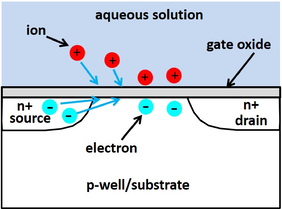For clinical or industrial applications specific ion sensing in aqueous samples is needed at extremely low limits of detection (LODs). For this purpose the ion-sensitive field-effect transistor (ISFET) can be used. In this device the gate is in contact with the solution, containing e.g. biomolecules or DNA, from which chemical charge in the solution at the gate (input) is mirrored to electric charge that governs the drain current (output). The aim of this project is to improve this mirror function that is expressed by the transconductance. We will study a new type of ISFET in which the total gate capacitance, and consequently its transconductance, is increased.
In this project as a proof of concept we will develop dedicated test structures of the proposed ISFET inside the NanoLab of the MESA+ Institute for Nanotechnology. In addition, extensive modelling and analysis of this device will be done in a dry environment. It is expected that this next generation ultrasensitive ISFET will show a highly improved LOD (less than 10 nM), enabling the detection of much lower concentrations of charged species.

Cross-sectional view of a conventional ISFET
This is a joint project between the Semiconductor Components (SC) group of the University of Twente and BIOS.
Contact information:


Elmer van Geijn
e.vangeijn@utwente.nl
Ray Hueting (SC)
r.j.e.hueting@utwente.nl
Wouter Olthuis (BIOS)
w.olthuis@utwente.nl
This project is sponsored by MESA+

